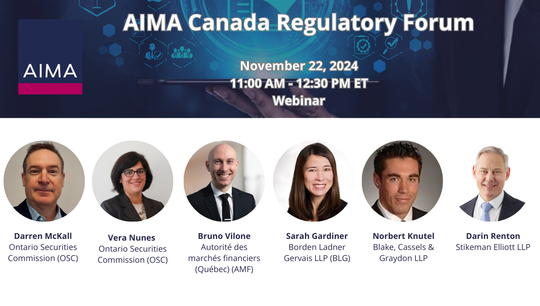The PR challenge for the hedge fund industry
By Henry Smith, Global Managing Partner, Maples and Calder
Published: 30 June 2015
Political candidates in UK, US and EU election campaigns unfortunately tend to expound populist views that there is something inherently bad about hedge and private equity funds. Views that claim they are secretive and only there to enrich the wealthy; they are unregulated, non-compliant and helped cause the global financial crisis; they cause jobs losses by asset stripping companies; they are based in secretive offshore tax havens and do not pay their fair share of taxes; and perform poorly against major market indices. The mainstream media, certain NGOs and even Hollywood movies, by focusing on the excesses on Wall Street or the few instances where a major hedge fund has failed, unfairly hype these views.
It is a tough on-going challenge to change these general public perceptions, but it is worth persevering as in many cases, they are simply uninformed and wrong. They may also lead politicians and regulators to develop bad policy and disproportionate regulation to the ultimate cost of those same voters and constituents they seek to protect or represent, and can cause unintended damaging consequences to their economies.
AIMA continues to work hard to educate politicians, regulators and journalists about what really goes on in the industry. AIMA's excellent research papers pulled together in "The Case for the Hedge Funds: A Compendium of Thought Leadership Reports" are well worth reading. Here are some of key messages to help address these PR challenges:
The global financial crisis
Blaming hedge funds for the global financial crisis was unwarranted. Official reports prepared for international regulators and various authorities acknowledged that hedge funds did not cause the global financial crisis, which was triggered by failures in the regulated banking industries. Even the largest hedge and private equity funds are neither "too big to fail" nor represent a systemic risk to the markets. Leverage in most typical hedge funds rarely exceeds one to two times assets (as opposed to 40 times assets in the banking industry) and no hedge or private equity fund required a state funded bailout. Hedge funds in fact brought much needed liquidity to the markets after the crisis.
The benefits to the global economy
Critics claim hedge funds serve no useful purpose and are merely vehicles for wild speculation, only benefiting the wealthy, often attacking currencies and shorting companies into oblivion or stripping jobs to profit hedge or private equity funds. The reality is different. Hedge and private equity funds are an integral part of the asset management industry and contribute to the economy in many ways:
- Job creation and tax. Hedge funds have created an estimated 300,000 jobs globally, including 240,000 in North America, 50,000 in Europe and 10,000 in Asia-Pacific. They contribute a sizable chuck of GDP in countries where the industries are located. This in turn generates significant taxable revenue for governments, for example, in Europe this is thought to be in excess of $8 billion; and that’s before you get to the knock-on benefits to other industries - real estate, restaurants, car dealers, etc. where these jobs are located and the consequential tax revenue generated. Whilst it might be seen as politically attractive to raise further tax revenues from the funds or workers in the industry, governments need to be careful that they do not reach a tipping point where their financial centres become uncompetitive and risk losing financial services business, with all the consequential effects for the economies. Recent statements in the UK that hedge funds benefit from a special exemption on stamp duty, for example, are incorrect since other UK authorised funds operate under the same regime.
- Capital allocation. Hedge and private equity funds are useful capital allocators and providers of market liquidity. Since the crisis, the hedge and private funds have stepped up to provide diversified funding sources to businesses to help them grow. They facilitate global capital investment flows into the major and developing economies and finance vital infrastructure projects and assets - such as commercial aircraft, ships, hospitals, roads, power plants in emerging market countries. Again, all of these are examples of how the industry helps economies create jobs and taxable revenues.
- Short selling. Rather than being a problem, some politicians believe short sellers provide essential liquidity to the markets and can often be an early indicator of which companies or sectors of the economy are about to experience difficulties. Short selling gives investors an ability to hedge risk of being invested on a long-only basis.
- Just for the wealthy. Much of the negative rhetoric assumes that hedge funds are simply for the wealthy or only benefit the fund managers, and ignore other major stakeholders. Securities laws in many countries may preclude non-accredited retail investors from investing directly in hedge funds, but about 30% of the over $2 trillion invested in hedge funds comes from pension funds. So everyone, through their pension funds, indirectly benefits from hedge fund investments and much needed portfolio diversification. Any politically driven increased costs, taxes or regulatory and compliance expenses have an indirect adverse consequence for the individual pensioners invested in those hedge funds.
Performance
Market commentators unfairly criticise hedge fund performance by benchmarking performance to the long-only major market indexes. Most hedge funds are not invested in portfolios to match the market indexes in that way. Investors can buy index funds if they want to do that. Hedge funds provide alternative investment opportunities and hedged, risk adjusted and less volatile returns. Long/short funds may underperform a long-only index in a bull market as they have to pay for the hedges. Over the longer periods hedge funds have been proven to outperform many asset classes on a risk adjusted basis. Long-only focused index investing carries significant performance risk and volatility - for example, investors in the NASDAQ index have only just regained their high-water mark from 2000 after 15 years.
Regulation and compliance
It is wrong for the media to say that hedge funds lack proper regulation and do not comply with the rules. That is simply not true. The vast majority of hedge fund managers are now regulated. Hedge funds domiciled in the Cayman Islands or the British Virgin Islands are also regulated. In addition, service providers around the hedge funds – custodians, prime brokers, fund administrators and Cayman Islands independent directors – are often subject to regulation. Collectively, the hedge funds have already invested more than $3 billion on compliance and individually spend anywhere between 5% and upwards of 10% of their operating costs on compliance. Governance in the hedge fund continues to improve and a large majority of hedge funds now have independent directors on their boards.
Tax havens and transparency
Those who allege hedge funds are secretive or non-transparent and based in offshore tax havens for nefarious purposes ignore some salient facts. Hedge funds can be limited considerably by securities laws from divulging much information to the media on marketing. This may foster their reputation for secrecy; but the reality is they must make numerous informational reports to their investors and regulators in the US and the EU, for example, by filing regularly Form PF and Annex IV information.
About 70% of all hedge funds and a large number of private equity funds are Cayman Islands companies for good reasons. The Cayman Islands government is often commended by the likes of the IMF, the Financial Stability Board, the FATF and governments for the way in which the Cayman Islands has promoted good governance and adopted international initiatives on AML/KYC and implemented good co-operation with international regulators (for example, in relation to the EU AIFMD), as well as committing to and implementing tax transparency initiatives such as FATCA, the European Savings Directive, a UK version of FATCA, the OECD Convention on Mutual Administrative Assistance in Tax Matters and the G5 countries’ pilot project on the automatic exchange of tax information. The Cayman Islands' anti-money laundering/know-your-customer laws are rated as good as many major OECD members' laws.
Institutional investors recognise all this and, after copious due diligence, take comfort that the Cayman Islands investment funds in which they invest are established under internationally recognised legal principles which protect their rights and have been successfully tried and tested through even the most severe of financial crises.
These are few examples of how the industry might address the PR concerns and misconceptions. It's important we continue to educate policymakers so they only introduce workable and proportionate regulation and tax policy, which will not heap unnecessary cost on institutional investors or exclude pensions from the world's best alternative investment funds. Thousands of jobs in the industry and the well-being of millions of pensioners depend upon it.
[email protected]
www.maplesandcalder.com
This article is intended to provide only general information for the clients and professional contacts of Maples and Calder. It does not purport to be comprehensive or to render legal advice.







